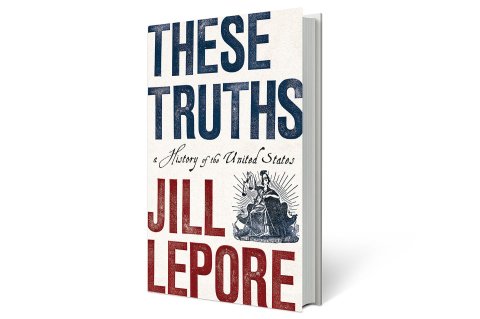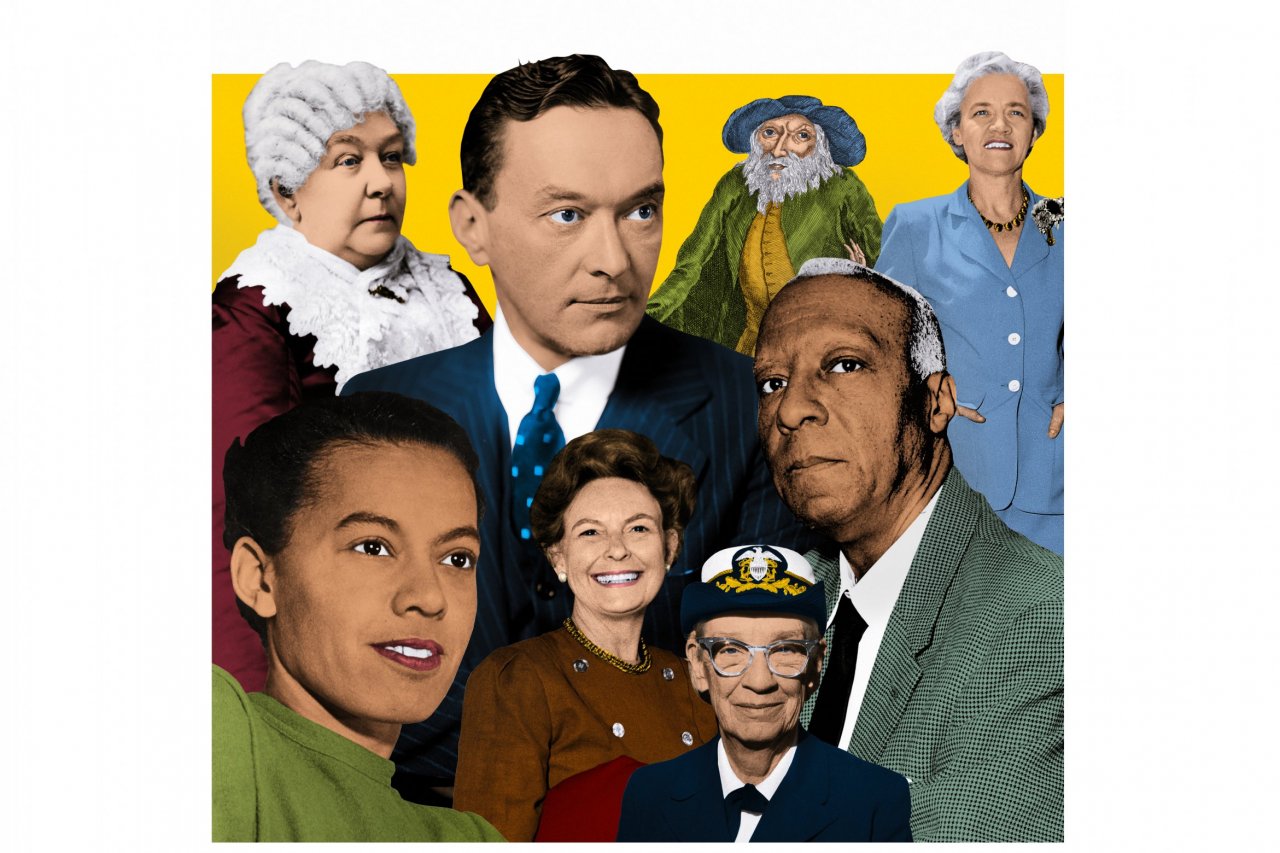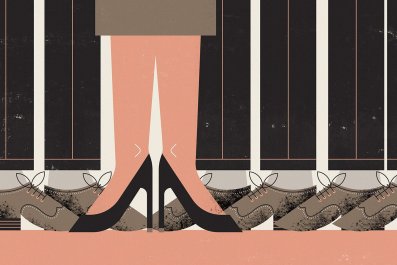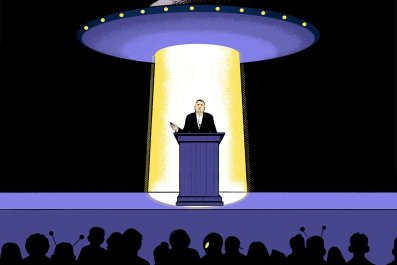In 2009, Jill Lepore was reporting on the Tea Party movement for The New Yorker. At a rally, she encountered a woman carrying a sign that read, "I want to live in 1773." Lepore was appalled. "How can anyone say that? Do you want to die in childbirth? Life in the 1770s was horrible!"
That experience, she says now, gave her "a heightened awareness of the problem of public discourse having no shared past. The idea that you could turn back the hands of time and collapse the distance between the past and present? We happen to be vulnerable to political manipulation around imagined histories right now."
Where, Lepore wondered, was the comprehensive narrative of America that tied together our past and present? She decided to write it herself. The result is: These Truths: A History of the United States (W.W. Norton & Company, $40). Lepore, a professor of American history at Harvard and a staff writer at The New Yorker, has written multiple award-winning books, among them 2010's The Whites of Their Eyes: The Tea Party Revolution and the Battle Over American History; 2013's Book of Ages, about Benjamin Franklin's sister Jane; and 2014's best-selling The Secret History of Wonder Woman. But These Truths, at least in terms of ambition, leaves her previous efforts in the dust. The title refers to the three political ideas—equality, natural rights and popular sovereignty—outlined by Thomas Jefferson in 1776, and the book recounts America's history from Christopher Columbus to President Donald Trump.
"Some American history books fail to criticize the United States," Lepore writes in her introduction. "Others do nothing but. This book is neither kind." Rather, she tells Newsweek, her goal was "to write an account of history that would explain the origins of the democratic institutions we take for granted—some of which are in free fall right now."

What's wrong with how we're taught history today?
We don't study it in a meaningful way, and that's only gotten worse because of this STEM [science, technology, engineering and mathematics] nonsense.
I wrote an essay for The New Yorker in 2014, "The Disruption Machine," in which I argue that Silicon Valley's idea of disruptive innovation is a fallacy. For example, Facebook's thing is "Move fast and break things." That involves an abdication of the past, because if you think about the past, you will only produce incremental change. It's like, "Oh no, you might actually change things slowly!" And that is actually what you're supposed to do. With the invention of digital media, nobody ever thought, Hey, what's good about a newspaper? Disruptive innovation became a fantasy of technological change, but it's spilled over into politics too. It's sold to you as a virtue: The less you know, the better.
In your view, what's lacking in American history textbooks?
There are four main problems. One is that there is no religion in American history textbooks. It's a blind spot of our historians. When I was a graduate student, there was critique from the Christian right about the secular regulation of higher education. I pooh-poohed that argument then, but religion was a force in American politics. Jefferson's notion that "all men are created equal" [from the Declaration of Independence] is not the same as ours today, which is piggybacked onto a spiritual notion of Christian equality. Abolitionists and other evangelicals believed in the equality of all men and women before God, regardless of color. There's a deep doctrinal commitment to that idea, but it didn't come until decades after the Declaration.
Another problem is that the stories are racially segregated. It's like, [cheery voice], "Jackson was elected, then Van Buren!" And in a text box on a separate page [ominous voice], "The domestic slave trade was accelerated." As if those things are unrelated! It's a weird segregation, and it makes no sense. As a kid, I remember thinking, So all this was going on, but then also slavery? They're happening at the same time, so what is the relationship?
Then on women's stuff, there's just nothing—some twee nonsense about Abigail Adams, and then Betty Friedan and Gloria Steinem make a cameo appearance. That's the end of our story! It's a complete dismissal of women as political actors and historical actors.
And, finally, there's no technology in accounts of our past. There's weirdly no STEM! [Laughs.] We know now that there is a relationship between technology, communication and our political culture. But that's always been the case, since the printing press.
You started writing the book in 2015, when Barack Obama was president. Was Donald Trump even on your mind?
I assumed I was going to end with Barack Obama's inauguration! I knew it wouldn't be done before the next presidential election—and I wrote strictly chronologically—but I figured the inauguration was a good ending. In 2016, when polls suggested that Hillary Clinton was going to win, I figured I'd mention it in an epilogue. And then Trump won. I thought, I actually have to include this election because it's politically mystifying. I knew everybody would have questions: What does it mean? Is this a new direction, or were we already going in this direction and we just didn't see it? It was an unhappy decision, because it's hard to offer a satisfying answer to those questions as a historian; we don't have perspective yet.
So I had to do two things: One, write an account of the American past in which Trump is not an inexplicable coda in a book that seems to be going in a completely different direction. And, two, not write an account of the American past in which it seems like the inevitable last chapter.

The themes of These Truths do seem particularly relevant to this administration. Did you rewrite any of the book after Trump's win?
The main themes were always there. I had the title from the start too; it was always going to be about the obligation of citizens of a democracy to have shared knowledge with which to make decisions. Maybe those things seem overdetermined now, but they were there long before Trump was elected. Remember, in 2005 Stephen Colbert coined the term truthiness . PolitiFact was founded in 2007. The fact-checking fetish has been around for a lot longer than we now perceive.
In the section "Battle Lines," you break down "a civil cold war" between liberals and conservatives, giving much credit to '70s activist Phyllis Schlafly for her takedown of the Equal Rights Amendment. Why spend so much time on her?
Schlafly doesn't get anything near the credit she should, even from fellow conservatives, as one of the leading political figures of the 20th century. Liberals just dismiss her as a crank. I don't agree with her about the [Equal Rights Amendment], but she was an incredible organizer. She's also a through line from the Cold War era of the 1950s to Trump—the last thing she did before she died in 2016 was to endorse him. Schlafly is like an octopus with tentacles, reaching across the conservative movement. One of the arguments in "Battle Lines" is how the failure to come to a political settlement about equal rights for women haunts the democracy to this day.
What, in your view, are mistakes liberals have made in recent years to contribute to our current political divide?
I find the callout culture to be just plain vicious. I can't identify a political, social or economic cause that it's actually advanced. I don't know if that's a big tactical error that people in a boardroom in Washington made so much as a parcel of a broadening failure of compassion.
I also feel frustration toward what are called the Atari Democrats—the Democratic National Committee outlook from Gary Hart onward. It's that Clinton-Gore attitude of "Let's get all our money from these rich people in tech centers, and then we don't need the white working class anymore." This was even before Silicon Valley and then certainly after it. I don't have much use for technological utopianism.
Has the internet affected the way you do your job as a historian?
The biggest problem is that people don't archive, which makes it harder to write about very recent history. I profiled Brewster Kahle, who invented the internet archive called the Wayback Machine. I titled the article "The Cobweb" because that's what the web is: You could blow and it would be gone.
Archivists all over the country are working on this—there are forums about digital archiving. But the daily lives of ordinary people? Fifty years from now, I'm sorry, but no one's going to have your Facebook page. That stuff will be gone. Or, if it does get kept, it will become useless because a search engine is not a viable means for doing scholarly research.
The asymmetry of the historical record is only widening, not narrowing, and that fills me with despair. Think of the [Works Progress Administration] chronicling the Okies, or Ralph Ellison interviewing people in Harlem in the '40s, asking, "What's life like?" We expect that people are chronicling narcissistically their every second, and yet the people that, frankly, I'd be most interested to hear from, this whole group of people we call "the undocumented"—we actually say that; it's like dystopian fiction!—are not on Facebook.
You end with Plato's famous "ship of state" metaphor. In America's case, that means rebuilding, then learning "how to navigate by the stars."
Part of that is my whole anti-algorithm attitude: I'm against having a machine fix our problems. So "navigating by the stars," instead of by your GPS. Look at the world around you with your own, true, God-given powers of acuity and observation and compassion, and think about what would be in the public good. Then follow that star. Do that instead of "If I slam Cuomo, that's going to get me half a point in the polls in this precinct." Or "If I write this outrageous post, then I'll get so-and-so more hits."
We cannot live in decency with one another that way. It's not working. That's not democracy; it's numeracracy or something—I don't know what it is. So that was my Hail Mary pass; I threw the ball and thought, I have to end with hope.
I used the ship metaphor because of a story about Henry Wadsworth Longfellow, who wrote a poem [1849's "The Building of the Ship"] about the ship of state that ended with the ship crashing. Charles Sumner [a Civil War-era senator from Massachusetts] came over for dinner and said, "Man, you cannot run that poem! The country needs you to write a better frickin' ending for your stupid poem!" So Longfellow wrote a new ending; it's very stirring, and inspires Lincoln to write some of his greatest speeches. This makes it seem like I'm comparing myself to Longfellow and Lincoln, and I'm not! I'm just saying, as a scholar, it's important to say, "The ship is now sinking." But as a citizen, you're supposed to say, "There's still time to save it."
This interview has been edited and condensed.
















